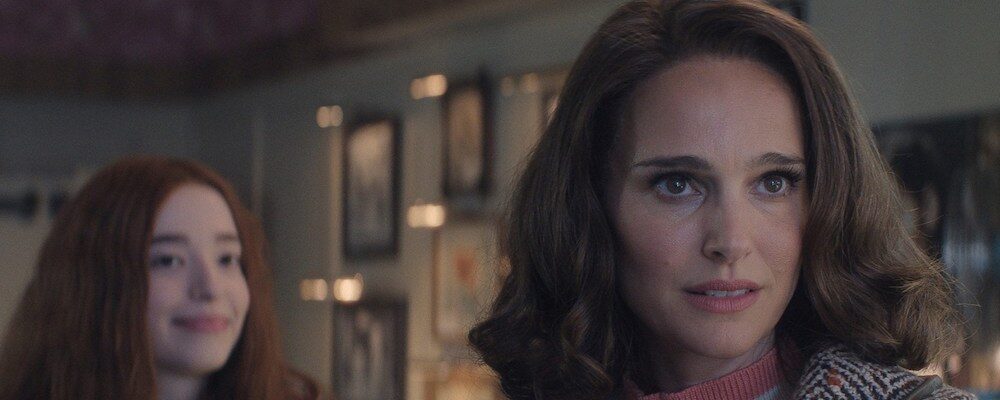‘Lady in the Lake’: A Compelling Natalie Portman Leads Apple’s Dense Adaptation of Laura Lippman’s Novel About Oppression
Alci Rengifo
It must be exhausting to write one of Apple TV’s adaptations. The streamer’s dramatic output has mostly been defined by high quality productions based on published material. These are lengthy shows that don’t seem to miss a paragraph or comma from their source material. Case in point, “Lady in the Lake,” a broad series based on the bestseller by Laura Lippman. The aim of this show is admirable in the way it explores a more challenging angle on prejudice. Natalie Portman is meticulously cast as the lead, evoking empathy and also the aloofness of a privileged suburbanite unaware of the suffering of others. It’s just an exhaustive tale to follow, full of dense subtext and multiple storylines fighting for attention.
In 1966 Baltimore, a housewife named Maddie Schwartz (Portman) belongs to the local suburban Jewish community. She once dreamed of being a journalist but settled down with Milton (Brett Gelman), who runs a home so kosher he basically fights Maddie to throw out Thanksgiving dinner over one taboo ingredient. On the other side of town is Cleo Johnson (Moses Ingram), a Black mother tied to a husband named Slappy (Byron Bowers), who hopes to be a comedian. To make money she keeps the books for a local gangster, Shell Gordon (Wood Harris). The city is also on edge because of the disappearance of a young girl. Maddie wishes she could join the search party but Milton isn’t keen on the idea. After a big fight, she leaves Milton and their teen son, Seth (Noah Jupe), and moves into The Bottom, meaning the city’s Black neighborhood. When Maddie discovers the missing girl’s body by a lake, it opens a chance for her to work at the local Baltimore Star. When Cleo meets a tragic end, Maddie then focuses on finding answers.
The great challenge in adapting a book or novel is how to find the movie or show hiding within the pages. The best TV adaptations know how to do it, in the same way a good film can be pulled out of a novel without translating every sentence. Showrunner Alma Har’el is so determined to stick to Lippman’s writing that the series even swerves into odd surreal territory, as if trying to conjure the kind of psychological landscapes novels pull off with the collaboration of a reader’s imagination. One entire episode is basically a dream sequence of Maddie walking through surreal landscapes in trying to solve Cleo’s murder. Visually it’s stunning, but it doesn’t add much to the narrative or tension necessary for a good drama or thriller. The other factor is how lengthy episodes feel because Har’el wants to keep the literal structure of a book. It can drag in trying to get to its main plot points.
But there are many good things in this series, starting with Natalie Portman. As an actor, she has chosen very good, challenging roles over the years. Her Maddie is a flawed anti-hero. She’s stifled by the environment Milton has created, along with the overbearingly traditional ways of everyone else around her. When she leaves, no one wants to understand her point of view, instead spouting religious slogans about the need of a woman to be tethered to a man. But she’s also from a privileged sector of society as a white woman who surprises even the cops when they learn she’s Jewish. She could pass for a WASP, while Cleo and her community are clear targets in a still-crushingly racist era. Maddie has good intentions when moving into The Bottom, even if she doesn’t realize she’s basically carrying out gentrification. It’s strong material that gets layered under added mysteries, like flashbacks to Maddie’s days as a high school newspaper journalist and old youthful romances.
Cleo’s perspective also has many compelling elements, from her own struggles as a Black woman to the tensions generated in the community between gangsters, politicians and followers of the Nation of Islam. Her cynical narration adds some necessary bite to the story’s social commentary. Although there is so much going on, we are not sure just what Har’el wants the story to fully say. In a sense it is about two minority women facing challenges in their own ways. Both come from communities carrying the baggage of slavery and for Maddie, the recent history of the Holocaust. Maddie soon begins an affair with a Black cop, Ferdie Platt (Y’lan Noel), which nearly gets lost in all the plot shuffles. Her editors don’t care about Black stories, so Maddie needs to really fight to solve Cleo’s killing. In a tighter film this would all thread together better, but “Lady in the Lake” runs at seven episodes at an hour each, so we get much meandering and loss of suspense because of how stretched out it all feels.
If you stick with the show it’s still an impressive piece of work on the level of production design, cinematography and performances. Portman is compelling by playing a woman desperately trying to recover who she was as a teenager, hoping the spark that made her love journalism is still there. But it’s not wise to chase after shadows of the past, because time changes us and experiences keep molding our characters. Finding out what happened to Cleo is then a form of potential redemption. So is Maddie doing this out of a genuine need to help the community, or just for personal satisfaction? It’s worthy, loaded material that “Lady in the Lake” never tries to simplify in a good way. This is a packed series with incredible talents involved, but it’s up to the viewer to decide if it’s worth the commitment.
“Lady in the Lake” begins streaming July 19 with new episodes premiering Fridays on Apple TV+.

